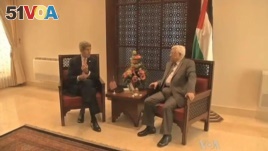December 04,2013
JERUSALEM — U.S. Secretary of State John Kerry is visiting Israel and the Palestinian territories in another attempt to bolster their faltering peace talks.
Kerry wants to give a boost to Israeli-Palestinian talks which have been rocky since they were revived four months ago.

Palestinian negotiator Saeb Erekat complained at a recent meeting with diplomats that the Israelis continue to expand Jewish settlements in the West Bank.
“These negotiations need to be protected," he said. "They need to be protected against a [Israeli] government that is acting for the settlers, by the settlers, from the settlers.”
Before Kerry's arrival, Israeli government spokesman Mark Regev reaffirmed Israel's commitment to the talks.
"The idea is to solve problems, to narrow the historic gaps that separate us," he said. "Israel is committed to making such an ongoing effort, I hope the Palestinians are too.
The head of East Jerusalem’s PASSIA think tank, Mahdi Abdul Hadi, said Kerry's visit is aimed primarily at restoring confidence at the talks.
“His [Kerry's] presence is a clear message that Washington is interested, Washington is following up the details, and Washington is going to work it out with all parties concerned with no exclusion of anyone," said Hadi.
But there is little optimism on either side, said Ephraim Kam, an analyst with Tel Aviv's Institute for National Security Studies.
"At the moment I don't see any chance for making progress, perhaps some progress on partial issues, temporary agreements, perhaps yes," he said. "But the Palestinians don't want it. They want a comprehensive agreement.
Kerry also is seeking to reassure the Israeli government that Iran will not be allowed to violate the recent interim accord freezing its suspected nuclear weapons program.
But many in Israel doubt Iran's sincerity. An analyst with the Institute for Counter-Terrorism, Ely Karmon, said the Iranian government wants to join the nuclear club to expand its influence on the world stage.
“Iran, or the Tehran regime, sees itself today not only as a hegemony in the Gulf, or even in the Middle East, but as a global power," he said. "So for this regime, and I think for even Iranian nationalists everywhere, the nuclear military capability is a must,.
Given these differences, expectations for any major breakthrough from this visit are low.